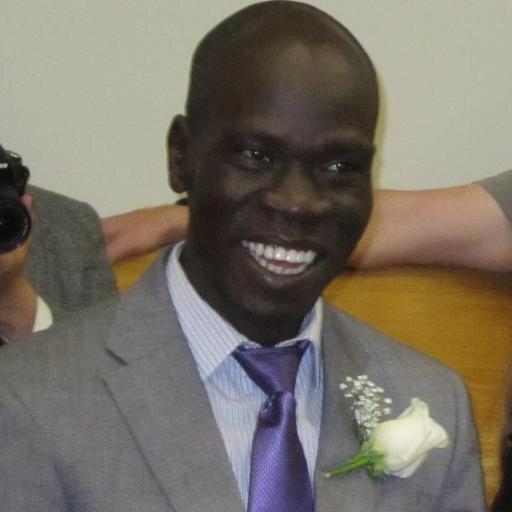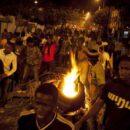Stalemate in South Sudan: Violent Leaders, Clueless Mediators – By Tongun Lo Loyuong

 South Sudan’s internecine civil war broke out almost 9 months ago and has already claimed tens of thousands of lives, displaced nearly two million people and left nearly five million at the mercy of impending famine. It shows no sign of abating any time soon. In part, this is due to a series of failures by South Sudanese leaders and the international community.
South Sudan’s internecine civil war broke out almost 9 months ago and has already claimed tens of thousands of lives, displaced nearly two million people and left nearly five million at the mercy of impending famine. It shows no sign of abating any time soon. In part, this is due to a series of failures by South Sudanese leaders and the international community.
The Intergovernmental Authority for Development (IGAD), the East African regional body mediating in South Sudan, seems paralysed and out of ideas. They have extended the deadline for the warring parties to reach a peace deal, having earlier threatened to levy heavy punitive measures on those derailing the peace process.
A consensus is fast developing that IGAD may be unable to deliver on its own promise of taking the peace spoilers, rights abusers and perpetrators of heinous civilian massacres to task, never mind swiftly brokering a lasting peace deal in South Sudan. Most South Sudanese are now convinced that at best IGAD will reinvent the status quo that culminated in the violent outbreak in the first place. This is a short-cut to ‘peace’ arrangement that will see South Sudan’s irresponsible political elites yet again loosely patched back in a power-sharing framework as an ‘African solution’ to this ‘African problem.’
In the meantime, the fighting continues. The fact that there are few examples of civil wars around the world that have ended in decisive military victories means a military solution in South Sudan is highly unlikely. So why the violent intransigence and the arms stockpiling to sustain it, when all indications suggest a clear military victory can never be achieved, let alone that such a means can lead to a conclusive end to the current political and violent inter-communal crisis in South Sudan?
The millions of ordinary South Sudanese citizens are by now resigned to the fact that their fate is unfortunately being determined by a ruling clique embroiled in violent power struggle, who perceive South Sudan and its people as a wild game””a kill that must be violently scrambled upon to secure a lion’s share. These so-called leaders are clearly more prone to violence with a view to securing political office, and less concerned with the already dire humanitarian situation of their own kith and kin created by their own irresponsible decisions and actions.
There are several complicating factors to South Sudan’s stalemate that also sustain the insatiable thirst for violence of South Sudan’s warring parties.
First, there is the culture of violence, death and revenge””part of some South Sudanese cultural traditions, and exacerbated by decades of civil wars and fratricidal South-on-South atrocious inter-communal conflicts.
One only needs to examine the repeated invocation of past violent incidents used to justify the triggering and perpetuation of the current cultural and political rivalry, to appreciate why the warring parties remain stuck to their violent course, despite the devastation it has already inflicted on the innocent and vulnerable members of the community. Revenge is the key word, in addition to greed and ambition to gain or retain political power.
As the uncompromising prosecution of the current civil war illustrates, the mindset of some groups in South Sudan, and not least the leadership of the warring groups, is shaped by the culture of revenge and prolonged exposure to violent practices, political or otherwise.
The culture of revenge is not only sustained by a vicious and self-perpetuating cycle at the expense of genuine search for peaceful means to resolve differences, but also by the inflated egos of its perpetrators. This leaves most members of both warring camps and their support bases suffering from what can be characterized as ‘superiority complex syndrome'””a condition that leaves one’s psyche disposed to some imagined notion of birth right and entitlement to rule and a self-perception of being first among equals.
The struggle for exclusive and undisputed securing of this status, primarily pursued through violent means, also mistakenly perceived as ‘courage’, is at the center of this rivalry and a core complicating factor to the persistence of the civil war in South Sudan. It is a clash of the titans of egos, sugarcoated with political rhetoric of a purported struggle between federal democracy and reform on the one hand, and the preservation of a status quo ante of a democratically elected and decentralized system of governance on the other.
Second, there seems to be little appreciation of these violent cultural dynamics or South Sudan’s socio-cultural dynamics, more generally, in the manner in which the civil war has been handled by South Sudan’s regional and international peace mediators and guarantors thus far. These actors seem to express little sense of urgency in “seeking to resolve” the political crisis in South Sudan.
The recent invitation of one of the heads of the principal parties to the civil war to the US-African summit is one example where South Sudan’s socio-cultural dynamics is under-appreciated. A grave error of judgment was committed by the Obama administration. That invitation, which came at a time when egregious human rights violations and civilian massacres were being committed under Salva Kiir’s watch in South Sudan, not only implicitly endorses Mr. Kiir’s poor governance performance in South Sudan, but also contributes to the derailment of the Addis peace talks.
After the summit, Kiir understandably came back to South Sudan with all guns blazing and was emboldened to redraw more of his famous ‘red lines’, adding to the obstacles thrown in the way of the peace process. This culminated in the failure to sign a final peace deal and form the transitional government of national unity
Third, the IGAD member states and Secretariat have equally displayed their lack of a genuine grasp of South Sudanese socio-cultural dynamics. They have also lacked any sense of urgency to speedily arrest the civil war from deepening the humanitarian crisis and contributing to plunging the entire East African region into a deeper mess. IGAD should have immediately held the parties to the conflict accountable for missing the August 10th deadline to conclude a peace deal and form a transitional government of national unity. Instead, IGAD has not only set a bad precedent by extending the deadline, but also thrust its credibility on the line. It may lead to IGAD losing the respect of both the warring parties and the people of South Sudan.
If any sustainable peace is to be achieved, and a meaningful transitional government to restore normalcy and spearhead a national healing and reconciliation process in South Sudan is to be formed, it must be without Kiir and Machar and the former detainees. The transitional government must be a government of technocrats that is accountable to the people. But that seems highly unlikely considering IGAD’s position of seeking to manage rather than resolve the crisis by maintaining Kiir, restoring Machar and including the remaining parties accountable for the current bloody mess in South Sudan in a transitional arrangement.
In short the international community and IGAD are part of the complicating factors to South Sudan’s civil war. They seem to fail to appreciate that South Sudan is composed of more than 64 ethnic groups and hundreds of tribes and must not be encouraged to be held ransom by any single one of them.
There are also individuals in these ethnic groups, including in the tribes from which the overwhelming majority of the belligerents in the current conflict hail, who are not parties to the conflict, nor intoxicated by the revenge culture and boast rich technical expertise and experience. Such individuals are the islands of hope and civility and zones of peace who provide better chance for a lasting peace and must, therefore be identified by IGAD and the international community, empowered and entrusted with the transitional government of national unity.
Moreover, any willingness on the part of IGAD and the international community to overlook justice for the civilian victims of South Sudan’s civil war will not only fail to resolve the conflict, but would also be counterproductive. It would exacerbate the conflict in the long run. In a culture dominated by revenge and violence, this is a sure recipe for future resumption of fighting, and a stumbling block to achieving lasting peace in South Sudan.
It is still possible for IGAD and the international community to help the people of South Sudan find lasting peace with justice and reconciliation. But it begins by holding current culprits of civilian atrocities and peace spoilers accountable, to break the vicious cycle of revenge and violence once and for all, and to foster sustainable peace in South Sudan.
Tongun Lo Loyuong is a South Sudanese peace researcher. He studied at the University of Notre Dame in Indiana and is currently pursuing a PhD in the UK. He is reachable at: [email protected] or: http://tloloyuong.wordpress.






IGADD has run out of ideas because there is a lack of understanding about South Sudan. The country is in a “pre-colonial” state. It has never had the benefits of colonial institutions. The different administrators in Khartoum, whether British, Egyptians or Sudanese Arabs, never did anything to build institutions in the south. South Sudan is a bunch of ethnicities with guns, nothing more. I continue to insist on the formula I put forward in early 2014 that the country needs to be placed under UN mentorship for a minimum of five years to bring the country up to minimum standards of governance. Such a program would include several thousand civilian administrators as well as blue helmeted security forces. The UN’s experiences in Namibia, East Timor and Cambodia were positive. Please do not tell me it is not feasible. It is the only way out.
It’s true that South Sudan as a geographic entity might not have had the advantage of being colonised by European powers like the rest of the continent. However when we talk of institutional developments, we should not underrate what the people of South Sudan did during the ten years of the Regional Autonomy Government that followed the 1972 Addis Ababa Agreement.
That was South Sudan’s success story. I myself am a product of that golden period. Of course the Dinka hegemony can’t be ignored and its role in undermining the hard won self rule soon became uncontainable.
Dinka are behaving the way the do not because they haven’t been colonized. Those of you who had the privilege of studying the modern history of Sudan will have noticed the roles played by prominent Dinka and other non Arabs throughput those historical periods.
The crisis here must be clearly stated lest we lay blames on the wrong culprit. The truth of the matter is that the Dinka who have often barked about being born to rule have in fact failed South Sudan by their crude cattle camp mentalities.
South Sudanese were colonized at different stages of their history, however not all of them managed to come out with any useful values that they can add to what they already had. Sheer crude arrogance and lack if in-depth understanding of the world around have lead us to be led by clueless generals like Sakva Kiir and his other empty half the so called general Paul Malong Awan.
The colonial era wasn’t all in vain. Believe you me, within that pathetic South Sudan there still exist pockets of nationalities who have come to fully understand the true concept of governance, state, accountability etc, and this can be abundantly seen in how their areas, villages and towns have embraced civilization in spite of the fact that they don’t receive much of financial assistance from the Dinka dominated central government!
African leadership continues to prove itself easily brought and influenced by leaders from other countries. If its not the U.S then it Europe, if not Europe than India, if not India then Japan, if not Japan then China. Over 50 years of the same nonsense and yet you not only do you wonder why there is still conflict but you wonder why so many expatriates don’t want to return to Africa – look no further this this. Follow the Chinese money trail and you will find the reason for a fueled conflict. China wants to put in position an entity that will work in its own interest despite their involvement in helping the north in the civil war. China not only helped supply weapon to the Northern Sudanese government but they also helped them build a small arms weapons facility in Khartoum. Those weapons then helped the Northern government kill your children, grandchildren, wives, husbands, grandparents. Yet you continue to assume China has your best interest at heart and you continue to reward them for being accomplices to the murder of your people by allowing them to maintain a 40 percent stake in the oil Greater Nile Petroleum Operating Company (GNPOC) and further extend their influence in your country. Follow the money trail people – follow the money trail.